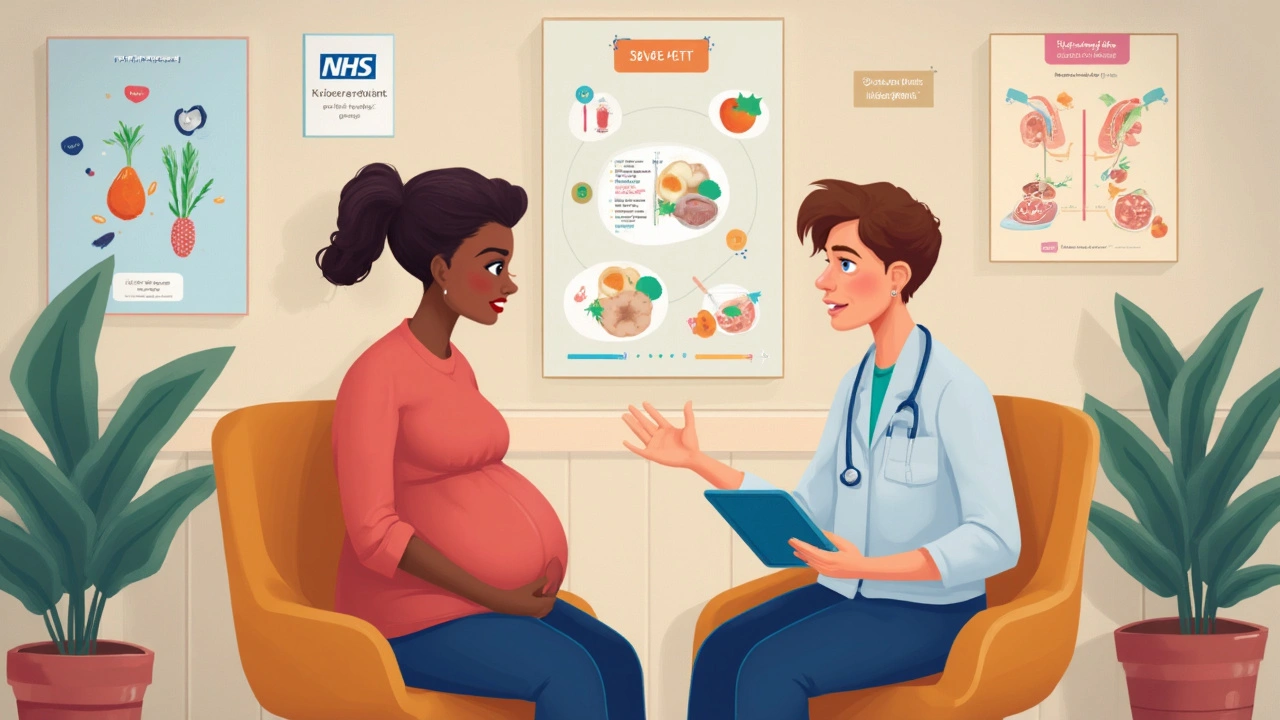Why Esophagitis Gets Worse During Pregnancy
Pregnancy turns your body’s routine upside down, and nowhere does that show up more than in your digestive system. Ever feel like that spicy burrito is trying to escape back up your throat? That burning sensation isn’t just heartburn—if it sticks around, it could be esophagitis during pregnancy. Esophagitis is inflammation of the esophagus, and pregnancy ramps up your risk for good reasons. Hormones like progesterone, which help keep your uterus calm, also tell your esophageal muscles to relax. This means the valve at the bottom of your esophagus—the lower esophageal sphincter—gets lazy, letting stomach acid sneak upward. Add a growing baby pressing on your stomach, and you get a perfect storm for acid splashes. Doctors see this all the time, and it’s not just discomfort you’re up against. If unchecked, it can make eating miserable or cause complications you don’t need while pregnant.
What’s wild is that nearly half of all pregnant women report new or worsened heartburn. That number jumps to over 70% in the third trimester as your uterus muscles into your stomach’s space. There’s also evidence that women who’ve never dealt with acid reflux find themselves in this battle for the first time somewhere between baby bumps and baby showers. And while a little heartburn is typical, ongoing burning, pain while swallowing, or regurgitation points toward esophagitis—a condition worth taking seriously since it can affect nutrition and your day-to-day comfort. It also risks ulcers, strictures, and rarely, infections of the esophagus if it gets severe enough. Bottom line? You’re dealing with an issue that’s more than a nuisance.
Ever notice your morning sickness morphing into persistent throat irritation as your pregnancy moves along? This is a common thread, especially as hormone levels peak. The famous OB-GYN study out of the University of North Carolina found the severity of heartburn predicts esophagitis, with spicy, acidic, or fatty foods being the biggest triggers. So when that plate of fries calls you, be warned. Gastroenterologists also point out that stress—a daily companion for many moms-to-be—can aggravate acid reflux and slow down proper digestion. Even something as routine as bending over to tie your shoes or lying down for a nap can let gravity pull acid upward. With so many forces at work, pregnant bodies are practically built for this annoying problem.
Yet here’s the catch: not all remedies you’d reach for pre-pregnancy are safe now. Some heartburn meds have possible links to birth defects if used in large doses, and even common antacids have their risks. You can’t just pop pills and go about your day like before—managing managing esophagitis while pregnant takes real strategy. That’s where getting clear guidance from experts makes all the difference. This article is your shortcut to understanding what’s happening and why it feels so relentless. Better yet, you’ll get a plan that eases symptoms and fits into daily life—no weird rituals, just advice that works in the real world.
Pregnancy-Safe Foods and Drinks That Soothe Esophageal Inflammation
Forget the old myth that drinking milk fixes heartburn—what really matters is building a belly-friendly menu, and it’s not just about skipping chili. Doctors specializing in acid reflux diet pregnancy say the key is to reduce acid while giving your digestive system a chance to heal. Certain foods really do make a difference. Bananas, oatmeal, and melons are top picks because they’re naturally low-acid and high in fiber. The right kind of whole grain bread can soak up acid, too. Think turkey over bacon, olive oil over butter, and steamed veggies instead of fried. A 2022 clinical review found that adding more plant-based meals (like brown rice, leafy greens, or sweet potatoes) cut reflux complaints in half in pregnant women by week six.
Some foods could be adding fuel to the fire. Tomatoes and citrus fruits are off the menu—too acidic. Chocolate, carbonated drinks, and coffee attack from other angles, relaxing your sphincter even more. Fried and fatty foods trap acid for longer, and spicy treats just make everything worse. Instead, plain proteins (like poached chicken or fish) get the green light most of the time. It sounds basic, but eating smaller, more frequent meals helps, too. When your stomach isn’t overloaded, acid production stays lower. If it feels like a lot to track, jotting down what triggers your symptoms can save you weeks of guesswork—and helps when talking to your doctor.
Let’s talk drinks. Water is always a winner, but if plain water gets boring, infuse it with cucumber or a splash of non-citrus fruit. Herbal teas like chamomile or ginger can soothe, but peppermint is out—it relaxes the sphincter muscle. And sorry, but those fizzy sodas will have to wait until after delivery. On the plus side, some women find yogurt (plain, low-sugar) helps cool that burning feeling, and kefir offers a probiotic bonus. Just keep an eye on dairy, as it helps some and aggravates others. Hydration matters because dehydration thickens your stomach contents, triggering reflux. Aim for about 80 ounces of fluids per day if you can tolerate it, with more needed if you’re active. Remember, less acid means less inflammation—every meal and drink counts.
Ever tried letting your dinner settle for two hours before bed? It’s not just folklore: the American College of Gastroenterology confirms it works, and so do gastroenterologists on the front lines. Your esophagus needs time to clear out acid before you lie flat, especially at night when symptoms get worst. Liquids and bland snacks late at night spell trouble, so if you’re starving before bed, stick with a tiny banana or some dry crackers. Making food swaps isn’t just an exercise in discipline; it’s your best weapon to calm esophagitis during pregnancy safely each day.

Daily Habits to Ease Esophagitis
Think you need a magic pill to fix managing esophagitis? It’s shocking how powerful a few habit changes can be. One of the biggest tricks? Elevate the head of your bed—most doctors say six to eight inches does the job. Gravity suddenly works in your favor instead of against you. Pregnancy pillows are a game changer, especially if you wedge yourself on your left side, which research shows helps reduce acid exposure at night. Even the act of chewing thoroughly and eating slowly makes a noticeable dent in symptoms. Rushed meals mean less saliva, and saliva is nature’s antacid.
Clothing isn’t just about fashion—tight waistbands or compression leggings can push acid back up. Stick with loose pants, dresses, or maternity clothes that don’t squeeze your belly. Bending to pick up laundry or a toddler? Squat instead of bending at the waist. Keeping upright after a meal for about 30–45 minutes gives gravity time to clear the pipeline. And a surprise benefit: gentle walks after eating can tame reflux almost as well as medication for many women, according to a Mayo Clinic study. Their gastroenterologists found physical activity linked with shorter reflux episodes.
Stress can turn small twinges into big problems by ramping up acid production and slowing digestion. The twist is, you don’t need hour-long meditation sessions to see benefits—just a few minutes of focused breathing or stretching can help. Apps like Calm or even a simple timer for mindful breathing can distract your brain from the burning sensation and loosen that knot in your chest. Many women discover that keeping a routine bedtime (with a wind-down ritual) not only helps their digestion but also improves sleep, which is harder to come by in late pregnancy.
If you smoke, quitting matters more than ever—it not only harms your baby but destroys your body’s natural acid barriers. The same goes for alcohol, which you’re likely already skipping. Pet peeve? Well-meaning friends or relatives promising that gum or mints will cure everything. Sugar-free, non-mint gum can boost saliva and give temporary relief, but too much can trigger gas, another reflux culprit. When nothing works, propping up on the couch with extra pillows after a heavy meal can get you through rough patches. Little details can make your day better—or much worse. The point is, everything you do can move the needle on esophagitis during pregnancy in the right direction.
Which Medications Are Safe for Pregnant Women?
This is where the road gets bumpy. Not all over-the-counter antacids are equal when it comes to pregnancy. Tums and Maalox (calcium carbonate or magnesium hydroxide) are considered safe for short-term use, as long as you don’t overdo it—a little goes a long way. Some antacids, especially those containing aluminum or high-dose sodium bicarbonate, are best avoided, as they can mess with your baby’s brain development or raise your blood pressure. And forget about bismuth subsalicylate (Pepto-Bismol); it’s a no-go according to the FDA and OB-GYNs. For women who need stronger options, H2 blockers such as famotidine and ranitidine (though ranitidine was pulled due to contamination in 2019) can be considered, but only with your doctor’s green light. As for powerful proton pump inhibitors (PPIs) like omeprazole, studies are mixed, but they’re usually reserved for severe cases where benefits outweigh the risks.
If you’re already on medication for stomach ulcers or GERD, never stop cold turkey without a doctor’s input. Some drugs—especially those for chronic reflux—can cause dangerous rebound symptoms. Always double-check labels and stick with brands your healthcare provider has reviewed. Pharmacists are also a great resource for spotting unsafe ingredients lurking in the fine print. For every woman who finds quick relief with Tums, there’s another who overuses them and ends up with kidney issues from too much calcium or magnesium. Using a medication journal (one study found this boosts safe use by 60%) helps you and your doctor stay on the same page.
Natural supplements like slippery elm or deglycyrrhizinated licorice have fans in the non-pregnant crowd, but gastroenterologists caution there isn't enough proof they're safe or effective during pregnancy. If you want to try something 'natural,' check with your OB-GYN first, since natural isn’t always safe for pregnancy. And don’t forget, some prenatal vitamins—especially those high in iron—can irritate your stomach further. If your symptoms get worse right after taking your supplement, bring it up at your next visit; your physician might suggest a different formula or dosing strategy.
Many women are tempted to 'tough it out' or only mention their symptoms at routine appointments. But severe pain, trouble swallowing, vomiting blood (even streaks), black stool, or sudden weight loss are red flags that need immediate attention, pregnant or not. Your provider may suggest an endoscopy if danger signs appear, though it's usually avoided unless absolutely necessary due to pregnancy risks. For more deep-dive info on medication safety, routines, and expert-backed swaps, check out this detailed breakdown on esophagitis while pregnant straight from pharmacy experts.

When to Seek a Gastroenterologist’s Help
Sometimes lifestyle tweaks and OTC meds just aren’t enough. Don’t grit your teeth and hope it’ll pass when burning, trouble swallowing, or chest pain comes back day after day. Gastroenterologists know that unchecked esophagitis during pregnancy can lead to complications—rare, sure, but real. Erosions or even bleeding ulcers can crop up, especially if you have risk factors like a history of reflux, obesity, or autoimmune issues. If pain radiates to your back, you’re losing weight rapidly, or your throat feels raw and tight, it’s time to call in a specialist.
Doctors will usually start by reviewing your food diary and medication history. They’ll ask about triggers, meal timing, and physical symptoms. While invasive tests aren’t the norm in pregnancy, they can sometimes order a non-contrast esophageal pH study or refer you for imaging if things look serious. A gastroenterologist can also coordinate with your OB-GYN to switch up meds or suggest higher-level interventions, keeping you and the baby as safe as possible. You aren’t alone in this—in fact, most large hospitals run joint clinics for high-risk pregnancies specifically because indigestion and esophagitis are so common.
One interesting fact: pregnancy itself is a temporary cause, so for 90% of women esophagitis drastically improves once the baby arrives. Meanwhile, you shouldn’t have to suffer. Communication is everything—don’t downplay your symptoms or avoid appointments. Instead, bring in your logs, questions, and yes, even your worries. Your specialist will help you find the safest ways to get relief and enjoy pregnancy (or at least eat dinner) without constant soreness or fear. Don’t wait for symptoms to get severe. Modern medicine has more tools than ever for managing esophagitis and keeping things as smooth as possible until your due date, so you can focus on the fun stuff—like picking baby names instead of decoding your menu.






yo so i was eating biryani at 2am last week and thought i was gonna die from the burn 🤯 turns out pregnancy + spicy food = bad combo. but hey, oatmeal at 3am saved my life. also, left side sleeping is a godsend. why didnt anyone tell me this sooner?
Of course it’s the ‘natural remedies’ crowd that shows up first. Let me guess-you’re also drinking apple cider vinegar with honey and sleeping with a lemon under your pillow? 🙄 You know what’s safe? Not eating pizza at midnight. And no, ginger tea doesn’t magically fix a broken sphincter.
Tums are my MVP. 🙌 I keep a pack in my purse, my car, and my nightstand. Also, bananas. Always bananas. And if you’re still burning after all this? Talk to your doc. No shame. You’re not ‘just being dramatic.’
The article uses ‘esophagitis during pregnancy’ inconsistently. It should be hyphenated as ‘esophagitis-in-pregnancy’ when used attributively. Also, ‘you’re dealing with an issue that’s more than a nuisance’ is grammatically incorrect-it should be ‘more than just a nuisance.’ Minor, but still.
bro i read this whole thing and the only thing that stuck was ‘don’t wear tight pants’. like. that’s the takeaway? why is this 2000 words long when the solution is ‘stop eating like a raccoon and wear sweatpants’
i just want to say i cried reading the part about bending over to pick up laundry. that’s my life now. also, i tried the bed elevation thing with 3 pillows and now i look like a human ramp. worth it though.
Let me get this straight. We’re being told to eat oatmeal and sleep on our left sides like we’re in a 1950s maternity pamphlet, but the real answer is: your body is a biological battlefield and you’re just along for the ride. No pill. No hack. Just suffering. And yet somehow, we’re supposed to be ‘grateful’ for this? 🤡
I’ve been doing the 30-minute upright thing after meals and honestly? It’s the only thing that’s kept me from screaming into my pillow at 11pm. Also, walking after dinner feels like a tiny rebellion against gravity. Small wins, right?
i just found out my baby moves more when i eat chocolate 😅 so i’m still having it. but only 1 square. and only at 2pm. and i dont lie down for 45 mins after. its a whole ritual now. also, yoga breathing helps. kinda. maybe. 🤷♀️
The worst part isn’t the burning. It’s the guilt when you can’t eat anything you actually like.
I was skeptical about the left-side sleeping, but after my OB told me it improves blood flow to the baby, I gave it a shot. Now I can’t sleep any other way. Also, I started drinking water between meals instead of with them. Small change, big difference. Thanks for the reminder that we’re not alone in this.